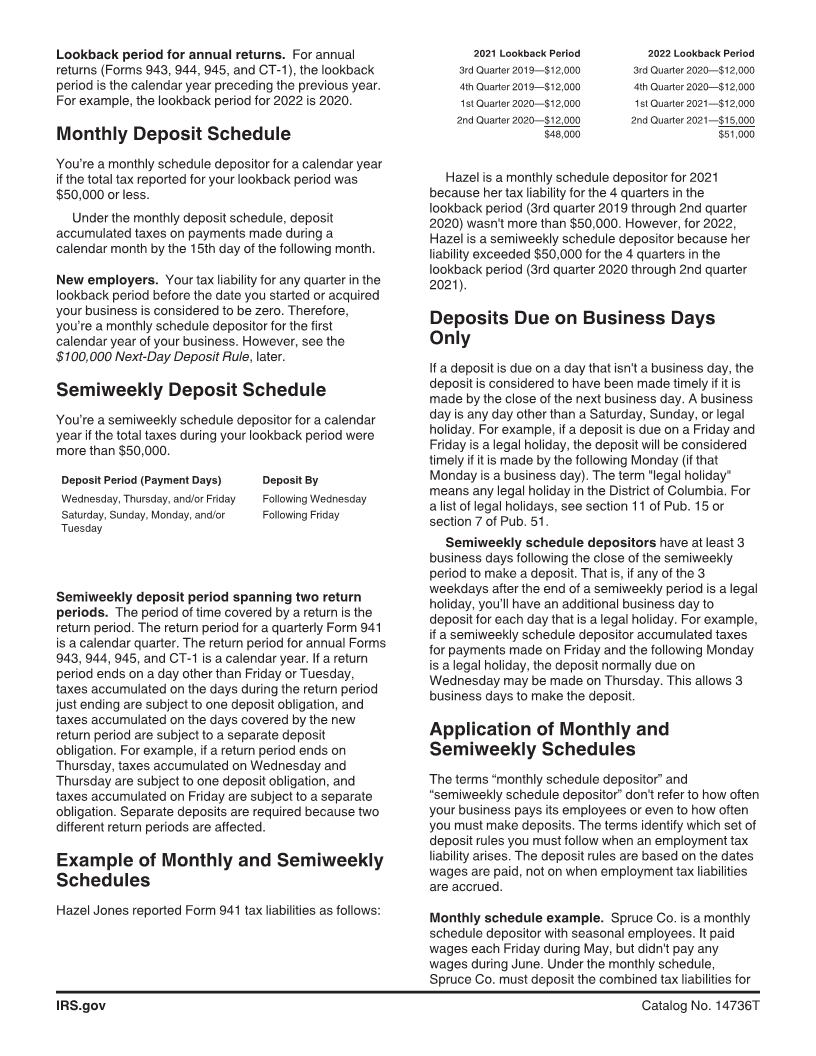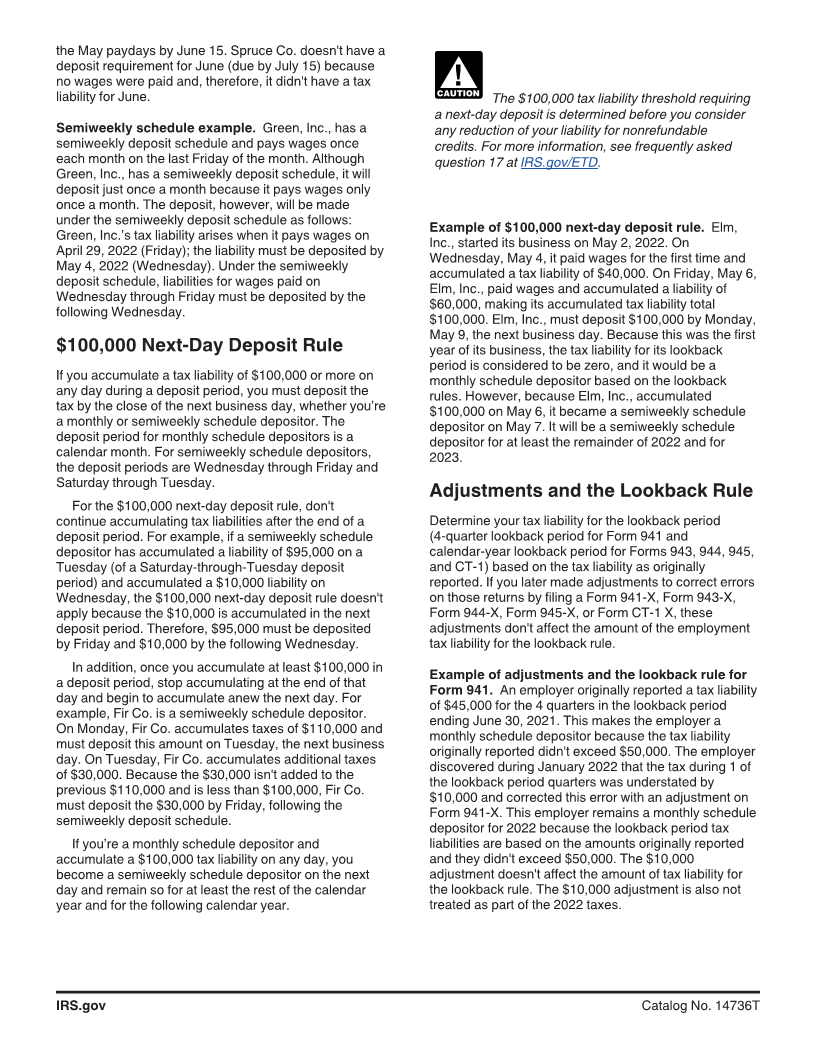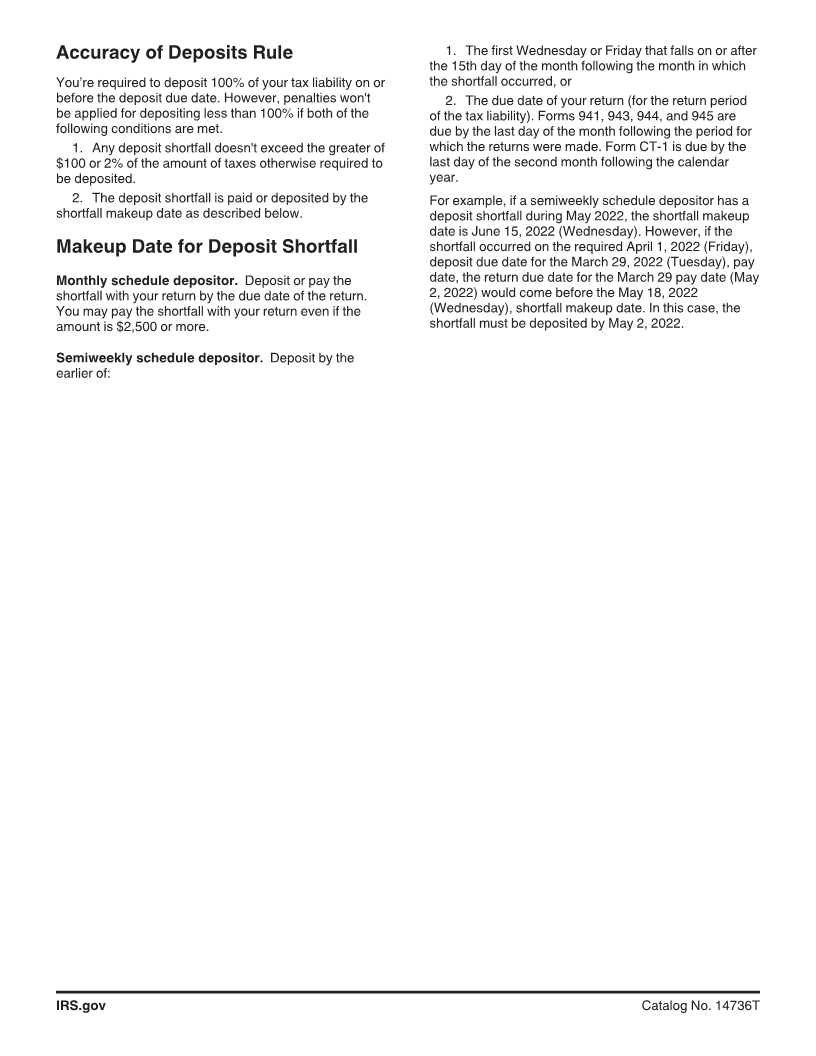
Enlarge image
Userid: CPM Schema: Leadpct: 100% Pt. size: 10 Draft Ok to Print
notice
Fileid: … ces/n931/202109/a/xml/cycle04/source (Init. & Date) _______
AH XSL/XML
Page 1 of 4 9:17 - 25-Aug-2021
The type and rule above prints on all proofs including departmental reproduction proofs. MUST be removed before printing.
Department of the Treasury
Notice 931 Internal Revenue Service
(Rev. September 2021)
Deposit Requirements for Federal tax deposits must be made by electronic
funds transfer (EFT). You must use EFT to make all
Employment Taxes federal tax deposits. Generally, an EFT is made using
the Electronic Federal Tax Payment System (EFTPS). If
There are two deposit schedules—monthly or
you don't want to use EFTPS, you can arrange for your
semiweekly—for determining when you deposit social
tax professional, financial institution, payroll service, or
security and Medicare taxes and withheld federal
other trusted third party to make electronic deposits on
income tax. These schedules tell you when a deposit is
your behalf. Also, you may arrange for your financial
due after a tax liability arises (for example, when you
institution to initiate a same-day wire payment on your
have a payday). Before the beginning of each calendar
behalf. EFTPS is a free service provided by the
year, you must determine which of the two deposit
Department of the Treasury. Services provided by your
schedules you must use. The deposit schedule you
tax professional, financial institution, payroll service, or
must use is based on the total tax liability you reported
other third party may have a fee.
during a lookback period. Your deposit schedule isn't
determined by how often you pay your employees or For more information on making federal tax deposits,
make deposits. See Application of Monthly and see section 11 of Pub. 15. To get more information
Semiweekly Schedules, later. about EFTPS or to enroll in EFTPS, visit EFTPS.gov or
call 800-555-4477 or 800-733-4829 (TDD). Additional
These rules don't apply to federal unemployment information about EFTPS is also available in Pub. 966.
(FUTA) tax. See the Instructions for Form 940 for
information on depositing FUTA tax. Depositing on time. For EFTPS deposits to be on
time, you must submit the deposit by 8 p.m. Eastern time
Deposit rules for Form 941. Your deposit schedule the day before the date the deposit is due. If you fail to
(monthly or semiweekly) for Form 941, Employer's submit an EFTPS deposit on time, you may use the
QUARTERLY Federal Tax Return, is based on the total same-day wire payment option discussed above.
tax liability you reported on Forms 941 during a 4-quarter
lookback period discussed later under Lookback period Lookback period for Form 941. Your deposit
for Form 941. schedule for a calendar year is determined from the total
Instead of making deposits during the current quarter, taxes reported on your Forms 941 in a 4-quarter
you can pay your total Form 941 tax liability when you lookback period. The lookback period begins July 1 and
timely file Form 941 if: ends June 30, as shown in the following chart. If you
reported $50,000 or less of Form 941 taxes for the
1. Your total Form 941 tax liability for either the lookback period, you’re a monthly schedule depositor; if
current quarter or the preceding quarter is less than you reported more than $50,000, you’re a semiweekly
$2,500, and schedule depositor. The lookback period for a 2022
2. You don't incur a $100,000 next-day deposit Form 941 filer who filed Form 944 in either 2020 or 2021
obligation during the current quarter. is calendar year 2020.
If you’re not sure your total liability for the current
quarter will be less than $2,500, and your liability for the Form 941 Lookback Period for Calendar
preceding quarter wasn't less than $2,500, make Year 2022
deposits using the semiweekly or monthly rules so you
won't be subject to failure-to-deposit penalties. For more Lookback Period
information about deposit rules for Form 941, see 2020 2021 2022
section 11 of Pub. 15. July 1 Oct. 1 Jan. 1 Apr. 1 Calendar
through through through through ← Year
Deposit rules for annual Forms 943, 944, 945, and Sept. 30 Dec. 31 Mar. 31 June 30 Jan.– Dec.
CT-1. Generally, the deposit rules for quarterly filers of
Form 941 also apply to annual filers of Form 943,
Employer's Annual Federal Tax Return for Agricultural TIP
Employees; Form 944, Employer's ANNUAL Federal Your total tax liability is the amount you reported on
Tax Return; Form 945, Annual Return of Withheld line 12 of Form 941 or Form 941-SS. Your total liability is not
Federal Income Tax; and Form CT-1, Employer's Annual reduced by the deferred amount of the employer or employee share
Railroad Retirement Tax Return. However, the period of social security tax, the refundable portion of the credit for
qualified sick and family leave wages, the refundable portion of the
used as your lookback period is different; see Lookback employee retention credit, or the refundable portion of the COBRA
period for annual returns, later. For more information premium assistance credit. For more information about deferring
about deposit rules for annual returns, see section 11 of social security tax and these credits, see the instructions for your
Pub. 15 (for Forms 944 and 945), section 7 of Pub. 51 employment tax return.
(for Form 943), and the Instructions for Form CT-1.
IRS.gov Catalog No. 14736T


